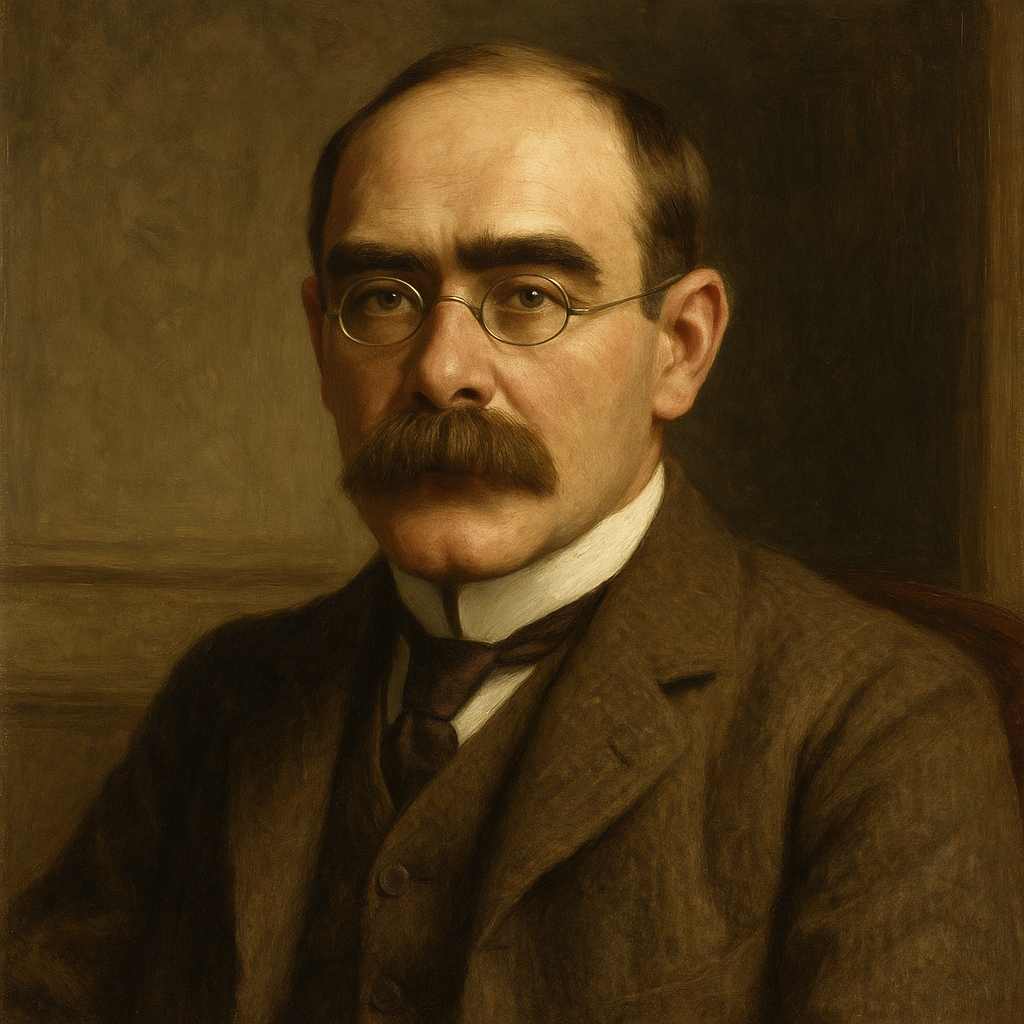If-
Rudyard Kipling
1865 to 1936

If you can keep your head when all about you
Are losing theirs and blaming it on you,
If you can trust yourself when all men doubt you,
But make allowance for their doubting too;
If you can wait and not be tired by waiting,
Or being lied about, don’t deal in lies,
Or being hated, don’t give way to hating,
And yet don’t look too good, nor talk too wise:
If you can dream - and not make dreams your master;
If you can think - and not make thoughts your aim;
If you can meet with Triumph and Disaster
And treat those two impostors just the same;
If you can bear to hear the truth you’ve spoken
Twisted by knaves to make a trap for fools,
Or watch the things you gave your life to, broken,
And stoop and build ’em up with worn-out tools:
If you can make one heap of all your winnings
And risk it on one turn of pitch-and-toss,
And lose, and start again at your beginnings
And never breathe a word about your loss;
If you can force your heart and nerve and sinew
To serve your turn long after they are gone,
And so hold on when there is nothing in you
Except the Will which says to them: ‘Hold on!’
If you can talk with crowds and keep your virtue,
Or walk with Kings - nor lose the common touch,
If neither foes nor loving friends can hurt you,
If all men count with you, but none too much;
If you can fill the unforgiving minute
With sixty seconds’ worth of distance run,
Yours is the Earth and everything that’s in it,
And - which is more - you’ll be a Man, my son!
Rudyard Kipling's If-
Rudyard Kipling's poem "If-" stands as a testament to the ideals of stoic masculinity and moral fortitude in the face of life's myriad challenges. Written in 1895 and published in 1910, the poem encapsulates the Victorian era's emphasis on self-discipline, perseverance, and moral rectitude. Through a series of conditional statements, Kipling outlines a path to personal growth and societal respect, framed within the context of fatherly advice to a son.
The poem's structure is crucial to its impact and meaning. Composed of four eight-line stanzas with an ABABCDCD rhyme scheme, the poem maintains a rhythmic consistency that mirrors the steady, measured tone of its advice. The repetition of "If you can" at the beginning of many lines creates a sense of accumulation, suggesting that the qualities described are interconnected and essential parts of a whole. This repetition also serves to emphasize the conditional nature of the poem's central premise: that achieving these virtues is possible, but requires conscious effort and dedication.
Thematically, "If-" explores several key virtues and their applications in various life situations. The first stanza emphasizes emotional control and self-confidence, balanced with humility and patience. Kipling advises maintaining composure "when all about you / Are losing theirs and blaming it on you," highlighting the importance of remaining calm under pressure and unjust criticism. The lines "If you can trust yourself when all men doubt you, / But make allowance for their doubting too" speak to the delicate balance between self-assurance and open-mindedness.
The second stanza delves into the realms of ambition, resilience, and integrity. Kipling warns against becoming enslaved by dreams or thoughts, advocating instead for a balanced approach to aspiration. The memorable lines "If you can meet with Triumph and Disaster / And treat those two impostors just the same" echo stoic philosophy, suggesting that one should not be overly affected by either success or failure. This stanza also touches on the theme of perseverance in the face of adversity, urging the reader to rebuild what has been broken with "worn-out tools."
The third stanza introduces elements of risk-taking and resilience in the face of loss. The imagery of gambling - "one turn of pitch-and-toss" - serves as a metaphor for life's unpredictability. Kipling advocates for the courage to take risks and the strength to face consequences without complaint. The stanza concludes with a powerful image of physical and mental endurance, pushing oneself beyond perceived limits through sheer force of will.
The final stanza broadens the scope from personal to social virtues. It emphasizes the importance of maintaining one's principles while interacting with diverse groups of people, from "crowds" to "Kings." The line "If all men count with you, but none too much" encapsulates the ideal of treating everyone with respect while maintaining emotional independence. The poem concludes with a striking metaphor of time as an "unforgiving minute," urging the reader to make the most of every moment.
The poem's conclusion, "Yours is the Earth and everything that's in it, / And - which is more - you'll be a Man, my son!" reveals the underlying purpose of the piece as fatherly advice. This framing device gives the poem a personal touch while also suggesting that these virtues are part of a generational legacy, passed down from father to son.
While "If-" has been widely celebrated for its inspirational message, it has also faced criticism in modern times for its gendered language and potentially outdated values. The poem's emphasis on stoicism and emotional restraint can be seen as promoting a restrictive view of masculinity. Furthermore, its colonial context - Kipling was often referred to as the "poet of the British Empire" - has led to scrutiny of the values it espouses.
Despite these criticisms, "If-" remains a powerful piece of literature that continues to resonate with readers. Its exploration of universal themes such as resilience, integrity, and self-improvement transcends its historical context. The poem's enduring popularity is a testament to Kipling's skill in crafting a piece that speaks to fundamental human aspirations and challenges.
In conclusion, "If-" by Rudyard Kipling is a meticulously structured poem that presents a comprehensive guide to personal conduct and character development. Through its use of conditional statements, repetition, and vivid imagery, it creates a compelling vision of ideal manhood rooted in stoic philosophy and Victorian values. While the poem's historical context and gendered language may invite critical analysis, its core messages about resilience, integrity, and balanced living continue to offer valuable insights to readers across generations.
This text was generated by AI and is for reference only. Learn more
Want to join the discussion? Reopen or create a unique username to comment. No personal details required!



Comments
No comments yet. Be the first to comment!